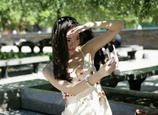
KELE is Shanghai dialect derived from the English word "color," meaning taste and refinement.
It refers to a group of Western-educated Chinese who came to prominence from the 1920s to 1940s and lived a cultured and refined life, representing the cultures of both East and West. Many were the social elite and many were involved in the arts.
Today, old locals typically use the term kele to describe elderly gentlemen who have seen the world, cultivate refined taste for the good things in life, and are keen on the small details of dress, dining, including elegant afternoon teas and even ballroom dancing.
The kele glamour of old Shanghai have been fading away, but the Kele Men Salon, which opened last August, aims to revive and promote that culture, ensuring that younger people don't forget the "golden days."
The group has been translated as Colormen Salon. Men literally means doorway or gate, but here it has the meaning "people of refinement."
"Colormen showcases the idea of a 'big' Shanghai and represents the city's noble traits," says Chen Gang, one of the founders of Afternoon Tea for Colormen.
Chen is the famous composer of the violin concerto "Butterfly Lovers" and a professor at the Shanghai Conservatory of Music with a wide social network.
"Shanghai was the cultural center of China in the 1930s, but it no longer is. Today the mass media promotes low-taste and fast-food culture that misrepresents the city's real culture. As a Shanghai artist, it is my responsibility to talk about Shanghai's glorious culture," he tells Shanghai Daily in an interview.



















![]()
